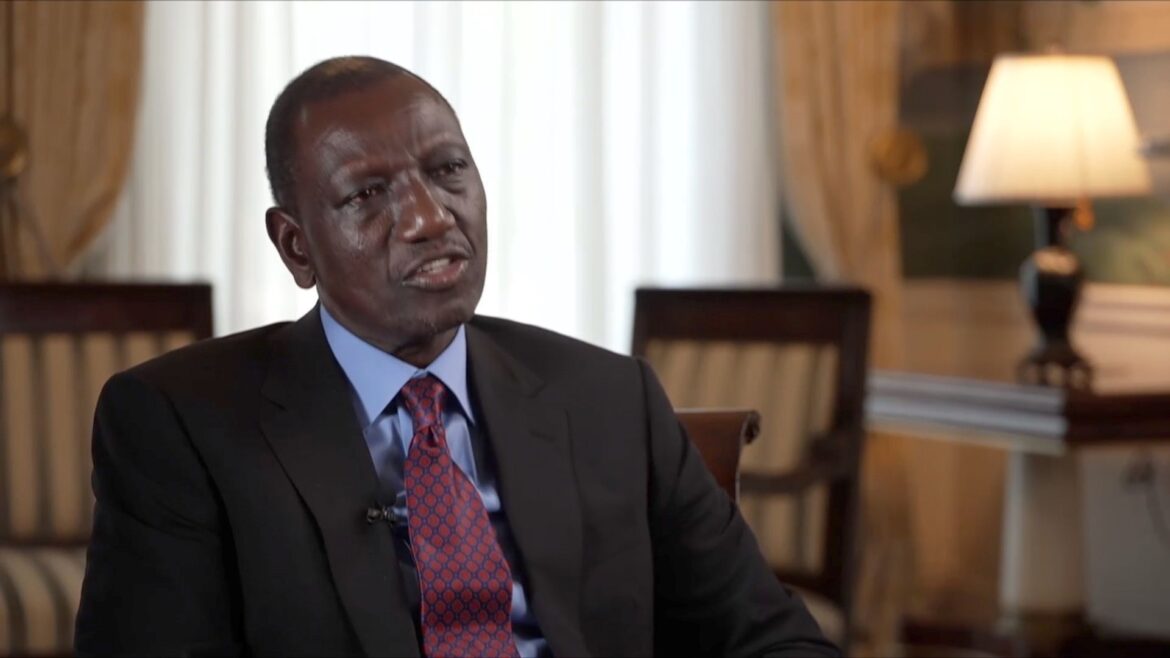Kenya police to arrive in Haiti in ‘three weeks’
Kenya’s President William Ruto has announced that a contingent of peacekeeping police from Kenya is anticipated to reach Haiti within approximately three weeks to assist in mitigating the escalating gang violence.
In an exclusive interview with the BBC, President Ruto affirmed that a preparatory team was already present in Haiti and had engaged with local law enforcement to finalize arrangements before the deployment of Kenyan troops.
President Ruto’s statements coincided with the conclusion of his three-day visit to Washington DC, marking the first official state visit by an African leader to the US in over 15 years.
During his visit, the White House advocated for the prompt dispatch of the multinational force led by Kenya following the tragic killing of three missionaries in Haiti, including an American couple, last Friday.
“As I speak to you, we have a team already stationed in Haiti,” President Ruto informed the BBC on Friday. “This will provide us with insights into the ground reality, available resources, and established infrastructure.”
He elaborated, “Once we have conducted this assessment in collaboration with Haitian authorities, we anticipate being prepared to deploy within approximately three weeks, once all groundwork is in place.”
Last year, Kenya offered to spearhead a UN-endorsed multinational security initiative aimed at restoring order to the Caribbean nation.
With gangs seizing control over significant portions of Haiti, particularly its beleaguered capital, Port-au-Prince, following the assassination of President Jovenel Moïse in July 2021, the situation has deteriorated significantly.
Friday’s incident, in which two US missionaries fell victim to gang violence, further underscores the urgency of the intervention.
President Ruto emphasized to the BBC that such occurrences underscore the necessity for his country’s intervention. “We cannot afford to continue losing lives, especially of missionaries,” he remarked. “Our objective is to prevent further loss of life at the hands of these gangs.”
The United States is also part of the multinational coalition collaborating with Kenya.
“The security crisis in Haiti demands immediate attention,” declared a spokesperson from the National Security Council on Friday.
They said President Joe Biden pledged to support the “expedited deployment” of the force in his talks with President Ruto.
Mr Ruto said that a base where troops and equipment will be kept – being built in conjunction with the US – is about “70% complete”.
The situation on the ground is growing desperate in Haiti and was described by UN Secretary-General António Guterres as “a living nightmare” last year.
However, the process of sending armed assistance has been met with delays.
President Ruto said his government has moved cautiously to ensure security concerns have been addressed, including plans for equipment, infrastructure, and building a relationship with Haiti’s police force.
The High Court in Kenya has also set a date of 2 June to hear concerns from the opposition party challenging the legality of the deployment of Kenya’s police force.
But President Ruto assured the BBC that there is a written agreement with Haiti’s transitional presidential council to ensure Kenya’s presence will be received as a “peacemaking” force and not an occupying force.
The council has signaled it intends to honor the agreement Mr. Ruto, which was signed by Haiti’s former Prime Minister Ariel Henry.
Mr Henry resigned in March after weeks of mounting pressure and increasing violence in the country.
Haiti is not the only country in crisis taking up Mr Ruto’s attention.
The president said he has Kenyans “in 15 different missions globally”, including in neighboring Somalia and the Democratic Republic of the Congo.
Mr. Ruto said he was also in talks with warring factions in Sudan, a country where the “level of human suffering is unacceptable”.
When the BBC asked if he feels the international community has lost focus on the humanitarian crisis in Sudan, Mr Ruto replied: “Yes, it has.”
“I think what’s happening in Ukraine, what’s happening in the Middle East, has taken some focus off of what’s happening in Sudan and our region,” he said.
Mr Ruto said that all of these situations require equal attention, a point he discussed with Mr Biden and US Secretary of State Antony Blinken during his visit this week.
The White House on Thursday named Kenya a non-Nato ally, making it the first sub-Saharan African country to receive that designation.
The non-Nato ally status will allow Nairobi to engage in closer security cooperation with Washington and obtain more sophisticated US weapons.
Although the measure strengthens US-Kenya diplomatic ties, Western influence in Africa has been on the decline, polls suggest, giving way to Russia and China.
When the BBC asked Mr Ruto if the US was a preferred ally, he replied: “It’s not a question of people trying to say whether we are facing west or facing east.


